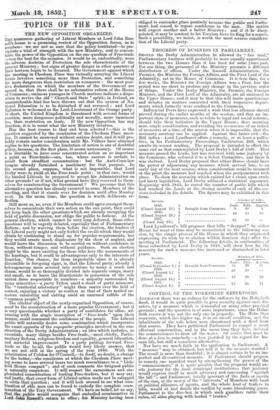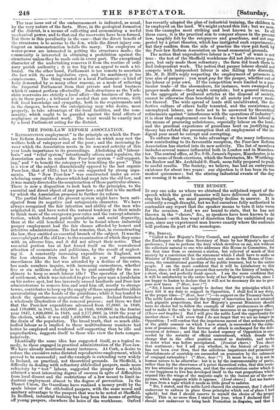CONTROL OF THE YORKSHIRE RESERVOIRS.
ALTHOUGH there was no redress for the sufferers by the Holnifirth flood, it would be quite possible to give security against such dis- asters, by a measure which is demanded on many other practical grounds ; and the question is of some importance, since the Holm- firth reservoir was not the only one in jeopardy. The Holm Stye reservoir, which lies higher up, is in an unsafe condition, and the inhabitants of the vale below were threatened with a deed from that source. They have petitioned Parliament to compel a more effectual construction, and in the mean time they have induced the commissioners to draw off the water. Of course that must be done at a loss to somebody—a loss justified by the regard for hu- man life, but still a vexatious alternative.
Nor have we much faith in the application to Parliament. A " measure " may be obtained, but will it be the measure wanted ? The result is more than doubtful ; it is almost certain to be an im- perfect and ill-contrived measure. If Parliament should propose to remedy one manifest want by strengthening the power of the commissioners," it is quite possible that the proposal would ex- cite jealousy for the local municipal institutions; that jealousy would express itself in much advocacy and canvassing " against the bill " ; and Parliament, totally ignorant of the facts or merits of the case, at the mercy of the " interests," of Members with local or political alliances, of agents, and the whole host of traders in bills, would at last decide the conflict by some blundering guess. Parliament is the dice-box in which such gamblers rattle their cubes, all aides playing with loaded " ivories." The true issue out of the embarrassment is indicated, as usual, by the very nature of the facts. Here, in the geological formation of the district, is a means of collecting and economizing a useful mechanical power, and to that end the reservoirs have been formed. But there is this peculiarity in the case—that the direct benefit of the structures is to accrue to the few, while the direct injury con- tingent on misconstruction befalls the many. The employers of water-power are interested in getting the structures made ; the -community is interested in obtaining a prohibition against the -structures unless they be made safe in every part. The exceptional character of the undertaking removes it from the routine of ordi- nary parish authority ; it is too big for an appeal to such a tri- -banal. On the other hand, Parliament is too remote to ascertain -the fact with its own legislative eyes, and its machinery is too -cumbersome. The thing wanted is a local Parliament—a kind of body demanded by so many other reasons, as a mode of relieving -the Imperial Parliament from that private and local business which it cannot perform effectually. Such structures as the York- shire reservoirs are strictly a local affair—the business of the peo- ple in those parts ; a tribunal is needed that can intervene, with full local knowledge and sympathy, both in the requirements and in the dangers, between the enterprising men who desire, most properly, to take advantage of the local facilities, and the com- munity, which ought to be guarded against the fatal effects of negligence or imperfect work. The want would be exactly met by a local Parliament acting for the district.



























 Previous page
Previous page